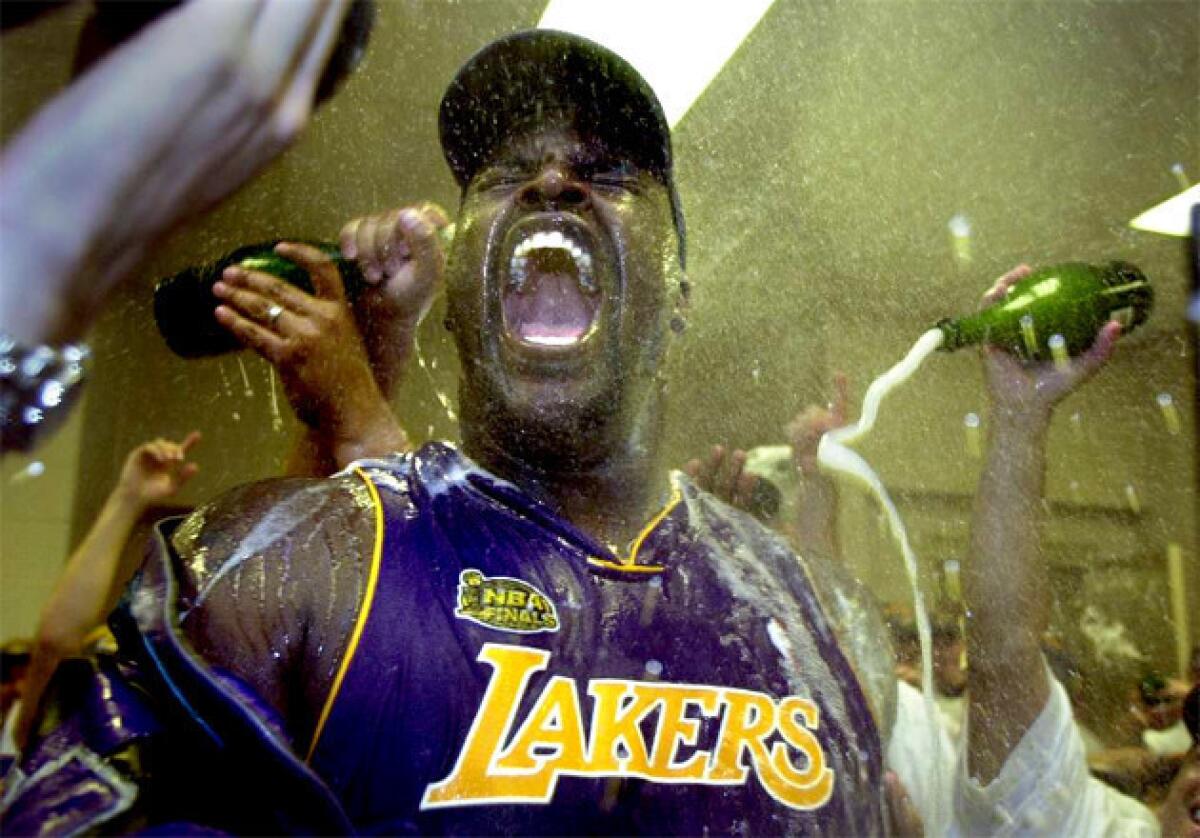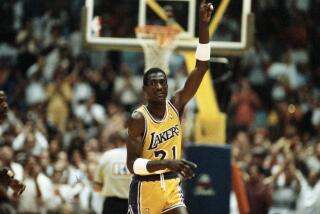Shaquille O’Neal to be elevated to level of great Lakers centers

- Share via
If Shaquille O’Neal needed a nickname on his first day as a Laker, it could have been the Big Worrywart.
As dominant as he was, the best big man in the NBA recognized he represented just a fraction of the Lakers centers who had come before him.
George Mikan won six titles while becoming Mr. Basketball. Wilt Chamberlain won two titles (one as a Laker) and scored 100 points in a game. Kareem Abdul-Jabbar won six titles (five as a Laker) and was the league’s all-time leading scorer.
What had O’Neal done, besides help the Orlando Magic go poof in a four-game sweep during the 1995 Finals?
“It was something I was terrified of,” O’Neal said of the Lakers’ legacy of centers. “We made it to the Finals that one year. That was good, but it wasn’t as good as them yet. Because in my mind I’m like, ‘Wilt’s got two [titles], Kareem’s got six and I have none.’”
O’Neal’s insecurities were only reinforced when Jerry West, then the Lakers’ executive vice president, placed his hands on the center’s broad shoulders shortly after he joined the team in July 1996 and told him to look up at the jerseys hanging from the rafters inside the Forum.
“He said, ‘Son, if you do everything correctly and do everything in a professional manner,’” O’Neal said, recalling their conversation, “‘you may be up there one day.’”
That day is here.
O’Neal’s No. 34 will join Chamberlain’s No. 13, Abdul-Jabbar’s No. 33 and the banner that honors Mikan’s No. 99 in the upper reaches of Staples Center on Tuesday when the Lakers play the Dallas Mavericks. After winning three of his four titles with the Lakers during a 19-season career that ended in 2011, O’Neal doesn’t need to fear his place in purple-and-gold lore anymore.
——
Collectively, the Lakers’ Biggest Four logged 11 most valuable player awards, 18 championships and 51 All-Star game selections over their careers. Fifteen of those titles came with the Lakers.
“It’s not surprising the success the Lakers have had,” said Hall of Fame guard Gail Goodrich, a member of the 1971-72 team that won the championship with Chamberlain and West, “because they’ve had great centers.”
The Lakers’ luck in acquiring those centers, however, was nothing less than extraordinary.
Chamberlain arrived via trade in 1968, purportedly after the Philadelphia 76ers refused to honor an alleged agreement with a deceased co-owner to give their best player part ownership of the team.
Abdul-Jabbar compelled the Milwaukee Bucks to trade him in 1975 after telling management the mid-sized city was incompatible with his large-market tastes. Los Angeles won out among the bidders despite having been third on his wish list of destinations, behind New York and Washington.
O’Neal picked the Lakers in free agency because he viewed the Magic franchise as largely non-supportive. The $120 million the Lakers were offering also didn’t hurt.
The Lakers made their own good fortune when it came to Mikan.
As the story goes, Sid Hartman, who was the team’s de facto general manager when the franchise was born in Minneapolis, deliberately took a wrong turn while driving Mikan to the airport in 1947 after a day of failed negotiations with the marquee center. Forced to spend the night, Mikan reconsidered and signed with the Lakers the next day. The bespectacled big man went on to lead them to six championships in the next seven seasons, the last five in the NBA.
“George could shoot either right- or left-handed,” recalled former Lakers coach John Kundla, 96. “He was very strong with both hands. It was hard to stop him.”
So hard that league officials doubled the width of the lane to keep the 6-foot-10, 245-pounder from stationing himself underneath the basket for easy points. He still led the league in scoring three times. Commissioner David Stern once called Mikan, who died in 2005, the NBA’s “first true superstar.”
——
The NBA was formed in 1946, and Harvey Pollack, the director of statistical information for the Philadelphia 76ers, is the only original team employee still working in the league.
“I’ve seen them all,” said Pollack, 91, who was the Philadelphia Warriors’ public relations director the night Chamberlain scored 100 points in 1962. “To me, he was the greatest player to play the game. He did everything. He scored, he rebounded and he was only center in league history to lead the league in assists.”
Was the late Chamberlain greater than even Bill Russell, who won 11 championships with the Boston Celtics? “Every game they ever played against each other,” Pollack said, “Wilt kills him in points and is four or five rebounds ahead of him.”
By the time he joined the Lakers in 1968, Chamberlain, then 32, was no longer the prolific scorer he had been earlier in his career, when he once averaged 50.4 points per game in a season. That didn’t make him any less coveted by a franchise thirsting for its next great center. Chamberlain averaged a Los Angeles franchise-record 21.1 rebounds during his first season with the team. It was just the opening act.
With Chamberlain hoarding rebounds and swatting shots, the Lakers won an NBA-record 33 consecutive games during the 1971-72 season on the way to their first title in L.A. He retired after one more season, leaving a void that would be capably filled three seasons later.
——
Abdul-Jabbar won five titles in the 1980s while teaming with Magic Johnson as part of the Showtime Lakers. The look of defeat from those who tried to stop the towering center’s sky hook sticks with one of his teammates to this day.
“Their head would drop and they would jog back down to the other end of the court shaking their head like, ‘What else could I possibly do to defend this?’” recalled Kurt Rambis, the scrappy forward who played alongside Abdul-Jabbar for seven seasons.
The 7-2 Abdul-Jabbar’s length, positioning and arm extension made his signature shot nearly impossible to stop, as he scored a record 38,387 points in his career.
Abdul-Jabbar could shoot with either hand, and scored inside and outside with layups, jump shots and dunks in addition to sky hooks. He also made a respectable 72.1% of his free throws over a career that lasted 20 seasons.
“After my initial couple of years with the Lakers,” Rambis said, “every single time he showed up to training camp you would go, ‘That’s it, he doesn’t have it anymore’ because he would come in out of sync and out of shape. By the end of training camp as he got back in rhythm again, you’d be, ‘He’s got another 40 years left in him.’”
——
O’Neal was famous for bestowing nicknames upon himself: Shaq-Fu, Big Aristotle and MDE, for Most Dominant Ever.
He never called himself the best Lakers center ever, and he isn’t about to now.
“I’m just good enough to be in the conversation,” said O’Neal, 41, who was given the night off from the TNT broadcast of the Lakers-Mavericks game to enjoy his jersey retirement ceremony.
O’Neal overpowered defenders, using his massive 7-1, 340-pound body as leverage before spinning away for layups or dunks. He teamed with Kobe Bryant to help the Lakers win three straight titles from 2000-02. “My style was dominating and intimidating people, making them quit, making them flop,” O’Neal said.
Rambis, who briefly coached O’Neal, remembered Dallas lampooning the big man with a scoreboard caricature of Fat Albert dribbling down the court while blaring over loudspeakers the cartoon character’s “Hey, hey, hey” catchphrase.
O’Neal just chuckled along with everybody else.
He does have a few regrets about a career in which injuries limited him to an average of 63 games a season.
“I’m kind of upset with myself for missing 250 games,” said O’Neal, who ranks sixth on the NBA’s all-time scoring list with 28,596 points. “If I had played those games and gotten an extra 5,000 points, I would have passed Wilt Chamberlain and then I would have the right to say I’m the most dominant big man ever to play.”
At the very least, having his jersey high above the Staples Center court will put O’Neal on the same plateau as his legendary predecessors while giving current Lakers center Dwight Howard an XXXXXXL reminder of the legacy he must uphold.
“Shaq’s jersey will be the only one hanging up there that’s probably a real jersey,” Rambis quipped. “Shaq was that big.”
twitter.com/latbbolch
More to Read
Go beyond the scoreboard
Get the latest on L.A.'s teams in the daily Sports Report newsletter.
You may occasionally receive promotional content from the Los Angeles Times.











